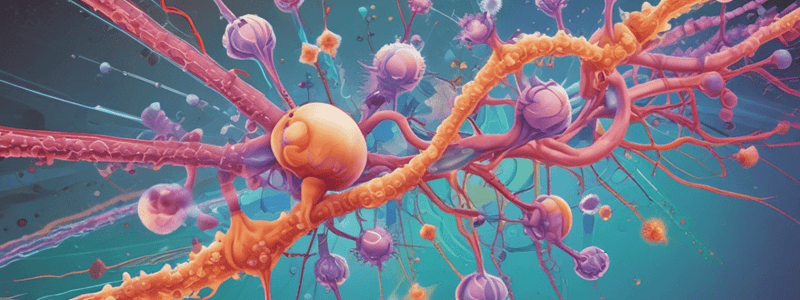Podcast
Questions and Answers
What is a major advantage of monoclonal antibodies over polyclonal antibodies?
What is a major advantage of monoclonal antibodies over polyclonal antibodies?
- They can be obtained from a variety of animals
- They require minimal purification
- They are more effective against large antigens
- They can be produced in a lifelong culture (correct)
Why are polyclonal antibodies often used against large antigens such as bacteria?
Why are polyclonal antibodies often used against large antigens such as bacteria?
- Because they can recognize multiple epitopes (correct)
- Because they are cheaper to produce
- Because they are easier to purify
- Because they are more specific to the antigen
What is a limitation of polyclonal antibodies?
What is a limitation of polyclonal antibodies?
- They are more expensive to produce
- They require a lifelong culture
- They are only produced in mice
- They have a finite source due to the limited lifespan of the animal (correct)
Why are monoclonal antibodies often used in immunoassays?
Why are monoclonal antibodies often used in immunoassays?
What is a difference between monoclonal and polyclonal antibodies in terms of purification?
What is a difference between monoclonal and polyclonal antibodies in terms of purification?
Which of the following is a limitation of polyclonal antibodies?
Which of the following is a limitation of polyclonal antibodies?
Why are monoclonal antibodies restricted to mice?
Why are monoclonal antibodies restricted to mice?
What is a characteristic of monoclonal antibodies in terms of their production?
What is a characteristic of monoclonal antibodies in terms of their production?
What is a reason why polyclonal antibodies are often used against large antigens?
What is a reason why polyclonal antibodies are often used against large antigens?
What is an advantage of using monoclonal antibodies in terms of their source?
What is an advantage of using monoclonal antibodies in terms of their source?
Flashcards are hidden until you start studying
Study Notes
Monoclonal Antibodies
- Restricted to mouse as source
- Can be developed and grown in cell culture, making it a quick and cost-effective method
- Offers a lifelong culture, ensuring a constant source of antibodies
- Requires minimal purification, as the antibodies are identical and uniform
- Most commonly used in immunoassays due to their high specificity and sensitivity
Polyclonal Antibodies
- Can be derived from multiple animal sources, as long as the animal is large enough
- Requires animal housing, which is subject to strict regulations
- Has a finite source, as the animal will eventually die of old age, and the antibody source changes each time a new animal is used
- Requires purification of antibodies from all other cell components, which can be a complex and time-consuming process
- Best suited for large antigens, such as bacteria, whose epitopes may change, and requires a mixture of antibodies to recognize different epitopes
Monoclonal Antibodies
- Restricted to mouse as source
- Can be developed and grown in cell culture, making it a quick and cost-effective method
- Offers a lifelong culture, ensuring a constant source of antibodies
- Requires minimal purification, as the antibodies are identical and uniform
- Most commonly used in immunoassays due to their high specificity and sensitivity
Polyclonal Antibodies
- Can be derived from multiple animal sources, as long as the animal is large enough
- Requires animal housing, which is subject to strict regulations
- Has a finite source, as the animal will eventually die of old age, and the antibody source changes each time a new animal is used
- Requires purification of antibodies from all other cell components, which can be a complex and time-consuming process
- Best suited for large antigens, such as bacteria, whose epitopes may change, and requires a mixture of antibodies to recognize different epitopes
Studying That Suits You
Use AI to generate personalized quizzes and flashcards to suit your learning preferences.




